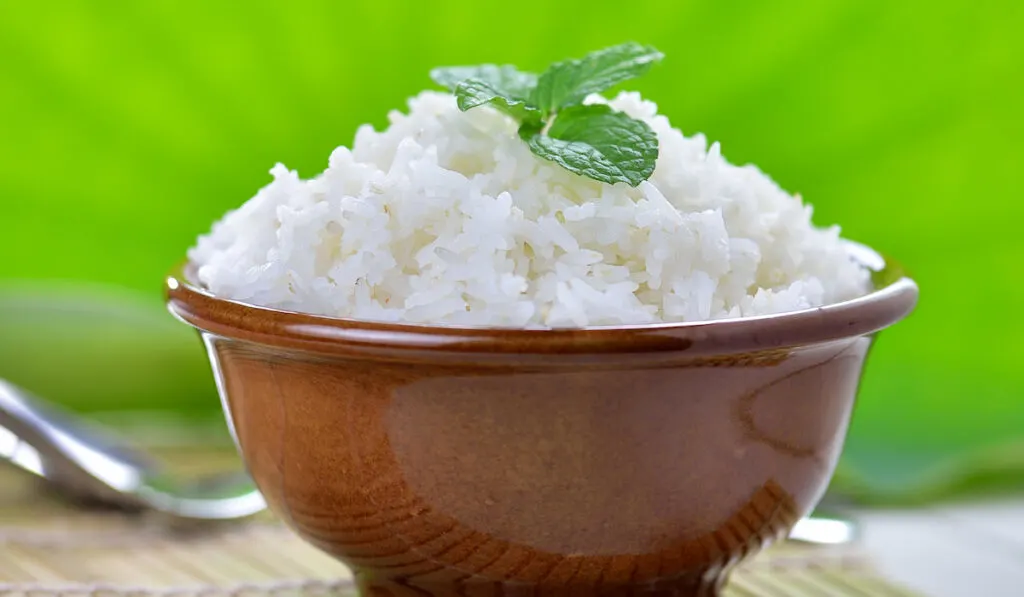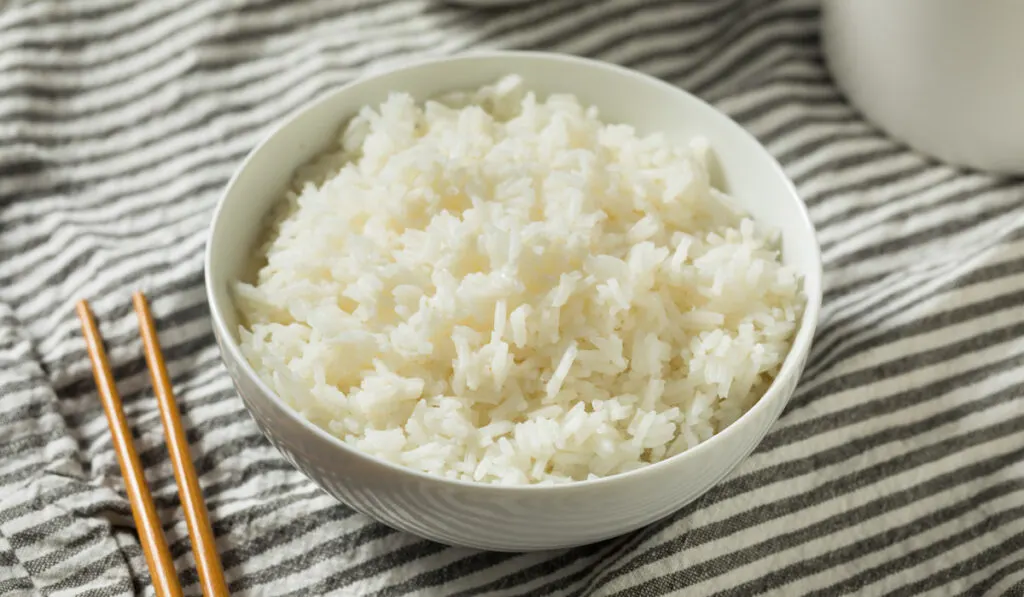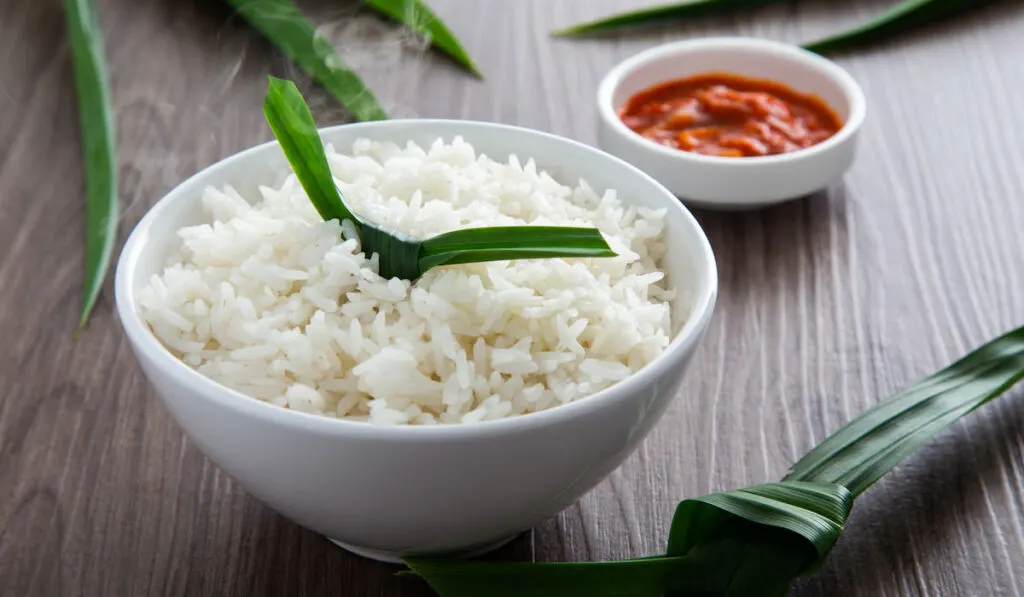Cooking the perfect rice is such a fine art that a whole gadget has been designed to do it well. But many people who don’t own rice cookers are still left uncertain about the whole process.
Have you ever wondered if you should rinse rice after it has been cooked?
No, you should not rinse rice once it has been cooked.
It will wash away the nutrients and leave your rice cold. It may also make it sticky and soggy. Rice should be dry and fluffy when it has finished cooking.
Let’s explore the situations in which you should rinse rice and what happens if you rinse rice after you have cooked it. You will soon be a rice-making pro!

Table of Contents
Should You Rinse Rice After Cooking?
No, it is not a good idea to rinse rice when you have finished cooking it. Rice should be boiled with just enough water in the pan to ensure that the grains are perfectly cooked, with no excess at the end.
This is what leaves you with deliciously fluffy rice – not sticky, wet, soggy rice. If you have ever had rice in a restaurant, you will know that it is served dry (save for any accompanying sauce or oil) and there is little moisture except possibly steam rising from it.
Rice is not rinsed after cooking by chefs, and you should not rinse it at home.
Why Shouldn’t You Rinse Rice After Cooking?
Rinsing cooked rice has a few disadvantages. These include:
- You will make your rice lumpy and soggy, which is not appetizing.
- You will make the rice cold.
- You will wash away the carbohydrates and proteins on the outsides of the grains, and this makes the rice less nutritious to consume.
- You will make the rice mushy if it is already slightly overcooked; the water will further break down its structure.
- Your rice has already absorbed lots of water, and rinsing it will just make it wet.
Your rice has a lot of water in it by the time it has finished cooking, so you don’t want to be adding more. Rinsing does not provide any benefits, so there is absolutely no reason to do it.
Some people say that rinsing prevents the rice from cooking further.
If you have cooked your rice to perfection, that might sound appealing. However, you should bear in mind that in order to completely stop the cooking process, you would have to make the rice cold – and this isn’t pleasant to eat.
You don’t need to stop your rice cooking, because it will mostly have stopped once the heat has been turned off and the water has been absorbed. A tiny bit more cooking due to the steam in the rice won’t hurt it.
Simply leave the lid off and put the pan somewhere cold, or spread the rice out on a flat tray to cool.
Serve the rice that is to be eaten, and don’t worry about rinsing it or doing anything further. Cooked rice is ready to eat.

Should You Rinse Rice Before Cooking?
Interestingly, it is a good idea to rinse the rice before you cook it, and you’ll find that most packets of rice recommend this.
In order to do it, you simply need to pour the rice you plan to cook into a bowl and add some cold water. You will notice that the water quickly turns cloudy. Gently swirl the rice around so that the grains get rinsed, and then drain them and add some more cold water.
Do this a few times, until the water is clearer than when you started. It doesn’t need to be completely clear (and you may not be able to get it completely clear). When you’ve finished, drain the rice and cook it as usual.
Note that you should not do this with risotto rice. Instead, sort through the grains for any debris, and then cook it as per the instructions on the packet.
Why Should You Rinse Rice Before Cooking?
Most rice should be rinsed before it is cooked because this improves the rice’s texture and flavor. There are a few other reasons, too:
- It smells better
- It may keep better
- Rinsing removes debris
- Rinsing reduces the starch

Rinsing your rice helps to wash away some of the starch that clings to the outsides of the grains.
This will make them fluffier and improve the flavor, and it may also make the rice smell nicer once it has cooked. Starch makes the grains sticky, and rinsing helps them to fluff up and soften well.
Some people also rinse rice to remove any debris. That might sound worrying.
Unfortunately, even though rice is processed and cleaned, it is very difficult for manufacturers to properly clean the grains and ensure that no dust or grit gets mixed in. Rice grains are so small, it is hard to sort them.
This can result in small bits of debris that do not belong in your food getting packaged with the rice. Rinsing it will give you an opportunity to remove these and wash away any unseen particles that you don’t want to eat.
Rinsing rice makes it nicer in a lot of ways, but there are a few kinds of rice you should not rinse. For example, risotto rice benefits from being starchy, because this makes the dish deliciously creamy. You should sift through risotto rice for any debris, but you shouldn’t rinse it.
Sushi rice and fortified rice may also be cooked without rinsing. Fortified rice may have powder on the outside that shouldn’t be washed away. In general, the rice packet will tell you whether you should rinse it or not.
Conclusion
Rinsing rice after cooking it can be done, but it shouldn’t be. It will not offer any advantages, but it will make your rice soggy and cold.
Stick to rinsing rice before it is cooked, and then simply serve and eat your rice hot from the pan afterward.
Resources
- https://www.theguardian.com/lifeandstyle/2017/oct/19/tips-for-cooking-perfect-rice-how-to-dale-berning-sawa
- https://www.insider.com/mistakes-when-cooking-rice-2017-12#not-rinsing-andor-soaking-your-rice-3
- https://trinitycreativetutorials.com/should-you-rinse-rice-after-cooking/
- https://www.quora.com/Do-you-rinse-off-rice-after-its-cooked
- https://www.thekitchn.com/yes-you-should-be-rinsing-your-rice-228083
